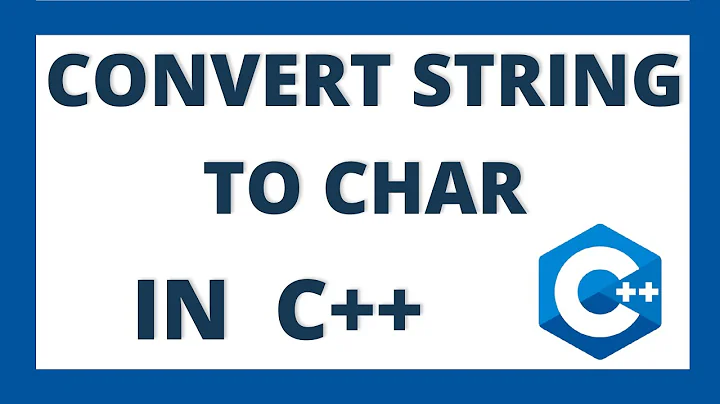How to convert a char array to a string?
Solution 1
The string class has a constructor that takes a NULL-terminated C-string:
char arr[ ] = "This is a test";
string str(arr);
// You can also assign directly to a string.
str = "This is another string";
// or
str = arr;
Solution 2
Another solution might look like this,
char arr[] = "mom";
std::cout << "hi " << std::string(arr);
which avoids using an extra variable.
Solution 3
There is a small problem missed in top-voted answers. Namely, character array may contain 0. If we will use constructor with single parameter as pointed above we will lose some data. The possible solution is:
cout << string("123\0 123") << endl;
cout << string("123\0 123", 8) << endl;
Output is:
123
123 123
Solution 4
#include <stdio.h>
#include <iostream>
#include <stdlib.h>
#include <string>
using namespace std;
int main ()
{
char *tmp = (char *)malloc(128);
int n=sprintf(tmp, "Hello from Chile.");
string tmp_str = tmp;
cout << *tmp << " : is a char array beginning with " <<n <<" chars long\n" << endl;
cout << tmp_str << " : is a string with " <<n <<" chars long\n" << endl;
free(tmp);
return 0;
}
OUT:
H : is a char array beginning with 17 chars long
Hello from Chile. :is a string with 17 chars long
Related videos on Youtube
RajSanpui
Around 9+ years experience into development C, C++, and Linux domain. Also understand Core-Java and consider it as a secondary skill. Currently, in addition to the developer responsibilities, i am also serving the role of DevOps engineer.
Updated on April 16, 2020Comments
-
 RajSanpui about 4 years
RajSanpui about 4 yearsConverting a C++
stringto a char array is pretty straightorward using thec_strfunction of string and then doingstrcpy. However, how to do the opposite?I have a char array like:
char arr[ ] = "This is a test";to be converted back to:string str = "This is a test. -
 RajSanpui over 12 yearsDirectly to a string is understood because it's not in array form, but your former one was a
RajSanpui over 12 yearsDirectly to a string is understood because it's not in array form, but your former one was akillermethod, which i was looking for. -
Ivaylo Strandjev over 12 yearsJust a side comment - it is possible to construct a string even from not-null terminated char array if you explicitly set the number of symbols.
-
 Mysticial over 12 yearsIt would still work either way. The overloaded assignment operator takes a
Mysticial over 12 yearsIt would still work either way. The overloaded assignment operator takes aconst char*, so you can pass it a string literal or char array (which decays to that). -
TOMKA over 12 years@kingsmasher1: Strictly speaking, strings in the form
"hello world"are arrays. If you usesizeof("hello world")it will give you the size of the array (which is 12), rather than the size of a pointer (likely 4 or 8). -
 RajSanpui over 12 years@dreamlax: Yes, that i was aware of, but i was trying to see a way to assign an actual array declared like:
RajSanpui over 12 years@dreamlax: Yes, that i was aware of, but i was trying to see a way to assign an actual array declared like:char arr[]to a string, which Mystical gave a great way to do. -
penelope over 12 yearsJust another side comment - if you need to use it in a longer expression, you don't have to construct a named object, this will work just fine:
std::string composite = "Have a " + std::string(arr) + " day" -
 RajSanpui over 12 years@penelope: Ahh that was similar to concatenating strings in Java. Again a great one, thanks :)
RajSanpui over 12 years@penelope: Ahh that was similar to concatenating strings in Java. Again a great one, thanks :) -
 CXJ about 10 yearsNote that this only works for constant NULL-terminated C-strings. The
CXJ about 10 yearsNote that this only works for constant NULL-terminated C-strings. Thestringconstructor will not work with, for example, a passed argument string declared asunsigned char * buffer, something very common in byte stream handling libraries. -
 R. Martinho Fernandes about 10 yearsThere's no need for anything being constant. If you have a byte buffer of any char type, you can use the other constructor:
R. Martinho Fernandes about 10 yearsThere's no need for anything being constant. If you have a byte buffer of any char type, you can use the other constructor:std::string str(buffer, buffer+size);, but it's probably better to stick to astd::vector<unsigned char>in that case. -
 Maarten Bodewes over 9 yearsCould you indicate in the answer how this is different from the accepted answer my Misticial?
Maarten Bodewes over 9 yearsCould you indicate in the answer how this is different from the accepted answer my Misticial? -
stackPusher over 9 years@owlstead please see the edit. I simply put my answer because its what I wish I saw when i first came across this page looking for an answer. If someone just as dumb as me comes across this page but isn't able to make that connection from looking at the first answer, i hope my answer will help them.
-
Christopher K. over 9 yearsAlthough it might be obvious:
stris not a convert-function here. It is the name of the string variable. You can use any other variable name (e.g.string foo(arr);). The conversion is done by the constructor of std::string that is called implicitly. -
Assil Ksiksi over 6 yearsThis is a better answer if you are using
std::stringas a container for binary data and cannot be certain that the array does not contain '\0'. -
huseyin tugrul buyukisik over 6 yearsWhere is free(tmp)? does string take care of that?
-
 Cristian over 6 yearsgood question. I think free should be there because I am using malloc.
Cristian over 6 yearsgood question. I think free should be there because I am using malloc. -
Brian Yeh over 3 yearsOr if the string array does not contain a '\0'
-
 stackprotector over 3 yearsThis does not work for character arrays in general, only if they are 0-terminated. If you cannot ensure that your character array is 0-terminated, provide a length to the
stackprotector over 3 yearsThis does not work for character arrays in general, only if they are 0-terminated. If you cannot ensure that your character array is 0-terminated, provide a length to thestd::stringconstructor like in this answer. -
Cerin over 3 years
error: ‘str’ was not declared in this scope







